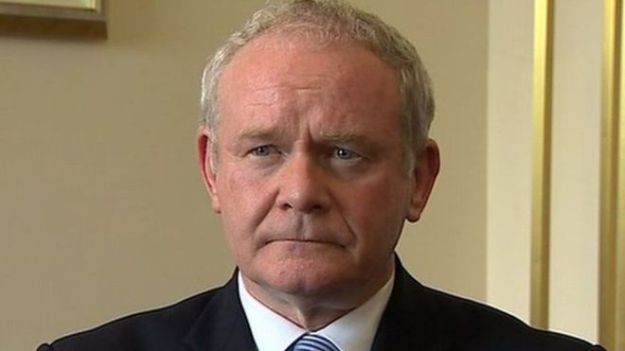As the surprise resignation of Martin McGuinness from the Northern Ireland Executive continues to unspool, opinion writers in Belfast, Dublin and London have offered a range of analysis. Here’s a sample:
Martin McGuinness has earned sympathy and respect
Fionnuala O Connor in The Irish News, nationalist.
Though it stuck in many craws to admit it initially and could never have converted some, the man known first as an IRA leader of clinical ruthlessness became an able front-of-house performer. … Sinn Féin’s best northern performer by some distance has carried too much expectation for too long. His departure ahead of Gerry Adams, now an uncertain performer who does more harm than good, is a blow to the party.
McGuinness letter of resignation was steeped in sanctimony
Belfast Newsletter, unionist.
Martin McGuinness has travelled a long way since his days as an IRA commander. Not only did he agree to share power at a Stormont parliament under the ultimate sovereignty of the UK, he has even at times seemed to be a moderate and pragmatic power at the top of Sinn Fein during previous crises such as over welfare reform. But a self-righteous, hypocritical and objectionable side to the outgoing deputy first minister was on display yesterday.
From IRA commander to political reconciler – the changing faces of Martin McGuinness, Belfast Telegraph, centrist.
McGuinness has an air of innocence about him, an almost childlike gladness in his nature, and yet he is the man who led the hard men. Many of his former comrades are so appalled by the incongruity, the mismatch between the reconciler and the old soldier that they no longer believe he was ever really on their side. He went further in his efforts to reassure unionists than they did in any effort to placate nationalism and republicanism.
Martin McGuinness’s departure represents failure on all sides, Newton Emerson in The Irish Times, Dublin.
McGuinness may be leaving office with his dignity intact, and many in Sinn Féin will relish the firmer line to come, but his departure still represents failure for all sides in Northern Ireland. Once again, unionists are about to be taught the lesson they never learn: deal with nationalism now, or get a worse deal later.
McGuinness has gone. Stability in Northern Ireland may go with him
Malachi O’Doherty in The Guardian, London.
…there is a high price to be paid for bringing down Stormont and forcing the British to restore direct rule. An obvious one is that the inquiry into the lavishly funded heating scheme will not now take place. McGuinness may have scuppered the very thing he was demanding.






